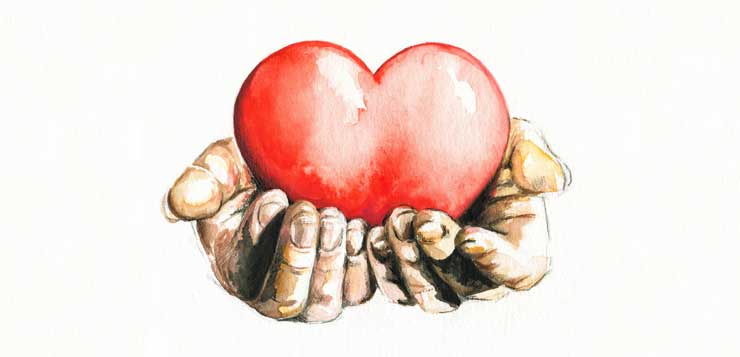Last week, my wife and I sat in a doctor’s office in Boston, waiting for news about her latest round of scans. She was diagnosed with Stage 4 colon cancer almost 2 years ago, not long after our son’s second birthday. Since that time, we’ve been through multiple surgeries, recurrences, chemotherapy, and dozens of late night trips to the Emergency Room.
After scans, it seems like we always have to wait at least 20 minutes for the doctor. I don’t mind waiting in the lobby, but once we’re in the office, it’s torture. I know that the doctor could walk in at any second with news that could change everything. I brace myself with every sound of footsteps in the hallway.
My wife and I always hold hands and meditate during this time. I bring my attention to my body and direct the energy of compassion to both of us.
In the path of mindfulness, we never know when our practice will lead to a deeper level of understanding and freedom. We just practice and allow the fruits to ripen in their own time. Thankfully, as we waited in that office, something opened in me and I experienced a new insight that has profoundly improved my life.
I sat with my awareness concentrated on my body and felt all of the tension and agitation that were present in me. The thought that kept arising in my mind was, “No. I don’t want this.” It felt like every part of me was rejecting the reality in which I found myself, as though I might be able to change it through pure force of will. I watched this happening in me and used my conscious breathing to keep myself from getting swept up in it.
I know that mindfulness practice is not just about slowing down and observing the surface of things. Instead, it invites us to look deeper in order to understand. It occurred to me to ask myself why I hated this experience so much, and the response was immediately, “Because I love my wife and I don’t want her to die.” Obvious, right? Yet, with my mind and body a little more grounded, it was a revelation. I looked at her and felt her warm hand in mine. I could see that I was in such pain because I don’t want to lose her—because she’s so precious to me. Yet right in that moment, there she is, alive and here with me. What am I doing grieving? I was so lost in pain that I couldn’t celebrate this real moment of being together. From this new perspective, it seemed like such a waste of time.
I was so lost in pain that I couldn’t celebrate this real moment of being together. From this new perspective, it seemed like such a waste of time.
When I teach about mindfulness, there’s an example I often use to show how the best intentions can go horribly wrong if we’re not aware. I ask people to imagine a man who gets cut off in traffic and then sticks his head out the window shouting obscenities and maybe even throws a plastic bottle at the other car. If we could pause in that moment and ask the man why he’s doing that, he might say, “Because that jerk cut me off.” Going a little deeper, we ask why that upset him so much and he answers, “Because it was really unsafe and disrespectful.” Oh, we say, so you want to be safe and respected? He says, “Of course.” So the way he’s trying to meet his need for safety and respect is to scream out of his car window and throw a bottle.
In that moment with my wife, I felt as misguided as the man in my story. There we were, alive and together. The intensity of my emotions was entirely based on how dear she is to me. The only thing that made any sense was to celebrate that moment of being together. I began crying tears of joy. In this present moment, we are alive and the only thing to do is to feel grateful.
When the doctor finally arrived, we got good news. At least for now, there is no progression in her disease. However, we’ve had enough good scans and bad ones to know this doesn’t mean we’re in the clear. A few months from now, we’ll be back in that same room with no way to predict what the doctor will say. Yet that moment belongs to the future. Right here and right now, we are alive and I refuse to waste of minute of this precious time. This experience is teaching us to celebrate the life we have, and that’s just what we’ll do.






